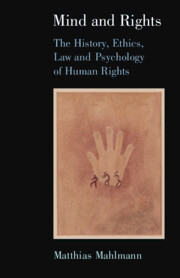Bibliography
Published online by Cambridge University Press: 09 February 2023
Summary
- Type
- Chapter
- Information
- Mind and RightsThe History, Ethics, Law and Psychology of Human Rights, pp. 469 - 494Publisher: Cambridge University PressPrint publication year: 2023
- Creative Commons
- This content is Open Access and distributed under the terms of the Creative Commons Attribution licence CC-BY-NC-ND 4.0 https://creativecommons.org/cclicenses/

